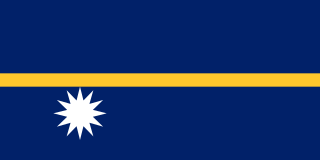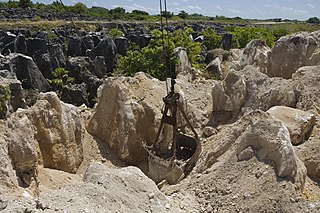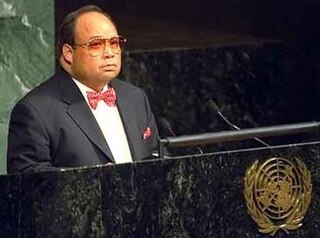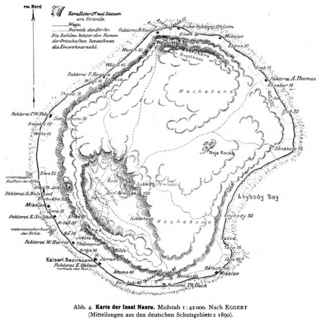
Nauru, officially the Republic of Nauru and formerly known as Pleasant Island, is an island country in Micronesia, a subregion of Oceania, in the Central Pacific. Its nearest neighbour is Banaba Island in Kiribati, 300 km (190 mi) to the east. It further lies northwest of Tuvalu, 1,300 km (810 mi) northeast of the Solomon Islands, east-northeast of Papua New Guinea, southeast of the Federated States of Micronesia and south of the Marshall Islands. With only a 21 km2 (8.1 sq mi) area, Nauru is the third-smallest country in the world behind Vatican City, and Monaco, making it the smallest state in the South Pacific Ocean, the smallest state outside Europe, the smallest island state, and the smallest republic. Additionally, its population of 10,670 is the world's third smallest, after Vatican City and Tuvalu.

The demographics of Nauru, an island country in the Pacific Ocean, are known through national censuses, which have been analysed by various statistical bureaus since the 1920s. The Nauru Bureau of Statistics have conducted this task since 1977—the first census since Nauru gained independence in 1968. The most recent census of Nauru was in 2011, when population had reached ten thousand. The population density is 478 inhabitants per square kilometre, and the overall life expectancy is 59.7 years. The population rose steadily from the 1960s until 2006 when the Government of Nauru repatriated thousands of Tuvaluan and I-Kiribati workers from the country. Since 1992, Nauru's birth rate has exceeded its death rate; the natural growth rate is positive. In terms of age structure, the population is dominated by the 15–64-year-old segment (65.6%). The median age of the population is 21.5, and the estimated gender ratio of the population is 0.91 males per one female.

Politics of Nauru takes place in a framework of a parliamentary representative democratic republic, whereby the President of Nauru is the head of government of the executive branch. Legislative power is vested in both the government and the parliament. The Judiciary is independent of the executive and the legislature.

The economy of Nauru is tiny, based on a population in 2014 of only 11,000 people. The economy is primarily based on phosphate mining, offshore banking, and processing of coconut products. Mining of phosphate ceased after the exhaustion of the primary phosphate reserves, but in 2006–07 mining of a deeper layer of "secondary phosphate" began. It is hoped that this economic activity might lift Nauru from the bottom rung of global GDP per capita. The only other major source of government revenue is sale of fishing rights in Nauru's territorial waters.

René Reynaldo Harris was President of the Republic of Nauru four times between 1999 and 2004. He was a Member of Parliament from 1977 to 2008.

Angam Day is a holiday recognized in the Republic of Nauru. It is celebrated yearly on October 26.

The World Association of Girl Guides and Girl Scouts is a global association supporting the female-oriented and female-only Guiding and Scouting organizations in 150 countries. It was established in 1928 in Parád, Hungary, and has its headquarters in London, England. It is the counterpart of the World Organization of the Scout Movement (WOSM). WAGGGS is organized into five regions and operates five international Guiding centers. It holds full member status in the European Youth Forum (YFJ), which operates within the Council of Europe and European Union areas and works closely with these bodies.

The displacement of the traditional culture of Nauru by contemporary western influences is very clearly visible on the island. Only little remains preserved from the old customs. The traditions of arts and crafts are lost nearly completely.

Junák - český skaut, is the internationally recognized organization of Scouts and Guides of the Czech Republic. Founded in 1911, Junák - český skaut is the largest organisation of children and youth in the nation, with a membership of 50,439.
Scouts South Africa is the World Organization of the Scout Movement (WOSM) recognised Scout association in South Africa. Scouting began in the United Kingdom in 1907 through the efforts of Robert Baden-Powell and rapidly spread to South Africa, with the first Scout troops appearing in 1908. South Africa has contributed many traditions and symbols to World Scouting.

John Fearn was an English ship captain, notable as the first European to report sighting the Pacific island of Nauru. He was probably born on 24 August 1768 in Kingston upon Hull.

Scouting and Guiding in Queensland is predominantly represented by Scouts Queensland, a branch of Scouts Australia in the State of Queensland, Australia and Girl Guides Queensland, a member of Girl Guides Australia. There is a small representation of the Australian Baden-Powell Scouts' Association.

Girlguiding Bermuda is a Guiding organisation in Bermuda. It is one of the nine branch associations of Girlguiding UK. It is represented by Girlguiding UK at World Association of Girl Guides and Girl Scouts (WAGGGS) level and Girlguiding UK's Chief Guide is also Chief Guide for Girlguiding Bermuda. Girlguiding Bermuda is part of the Caribbean Link for Guiding.
The Scout and Guide movement in Australia consists of

Australia–Nauru relations refer to foreign relations between Australia and Nauru. Australia administered Nauru as a dependent territory from 1914 to 1968 and has remained one of Nauru's foremost economic and aid partners thereafter. Nauru has a consulate general in Brisbane. Australia is one of only two countries to have an embassy in Nauru. Both countries are members of the Commonwealth of Nations.
In Nauru, the Nauru Congregational Church is the largest religion, encompassing 35.71% of the population as of the 2011 census. Freedom of religion is a constitutional right, and the country's laws and society uphold this right without any significant breaches.
Media in Nauru remain undeveloped, but Australian aid program AusAID has been financing and supporting their development. As of February 15, 2010, Nauruan media consist in a television station and a radio station, with a fortnightly newspaper due to be launched within days. Former Australian Broadcasting Corporation broadcaster Rod Henshaw is serving as interim media director for the Nauruan government.

The Japanese occupation of Nauru was the period of three years during which Nauru, a Pacific island under Australian administration, was occupied by the Japanese military as part of its operations in the Pacific War during World War II. With the onset of the war, the islands that flanked Japan's South Seas possessions became of vital concern to Japanese Imperial General Headquarters, and in particular to the Imperial Navy, which was tasked with protecting Japan's outlying Pacific territories.

India-Nauru relations refers to the international relations that exist between India and Nauru. These have been established since the island's independence in 1968.
















